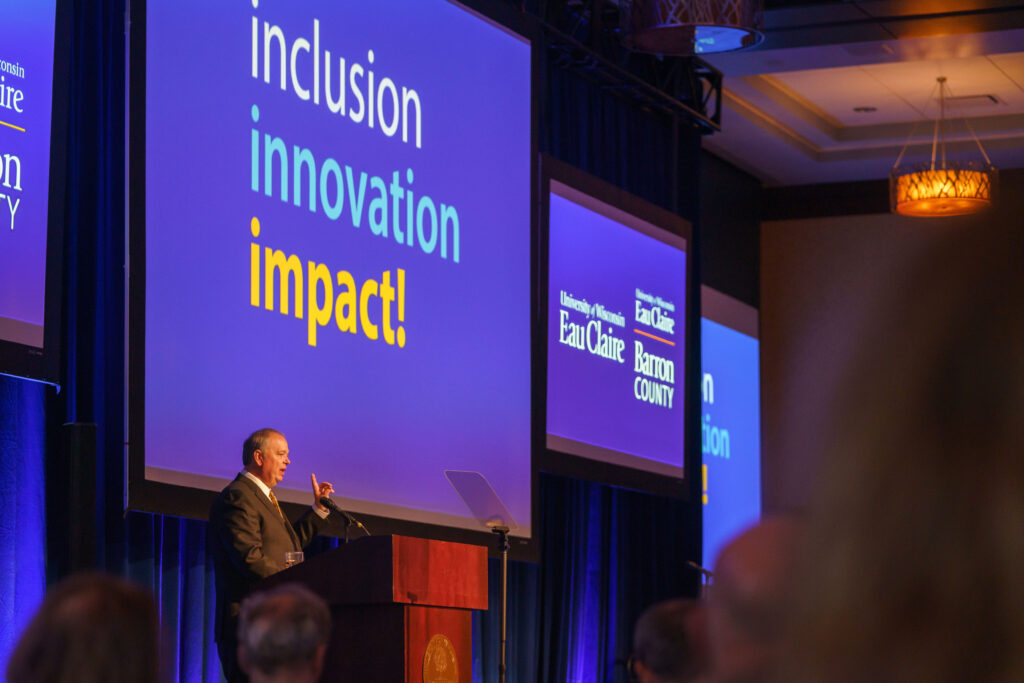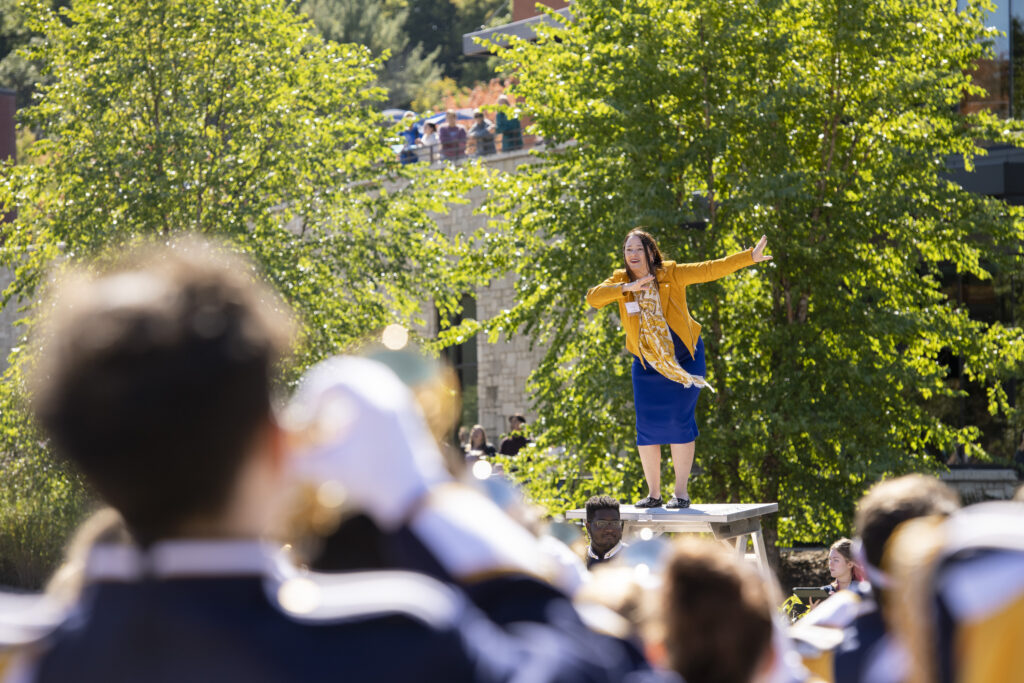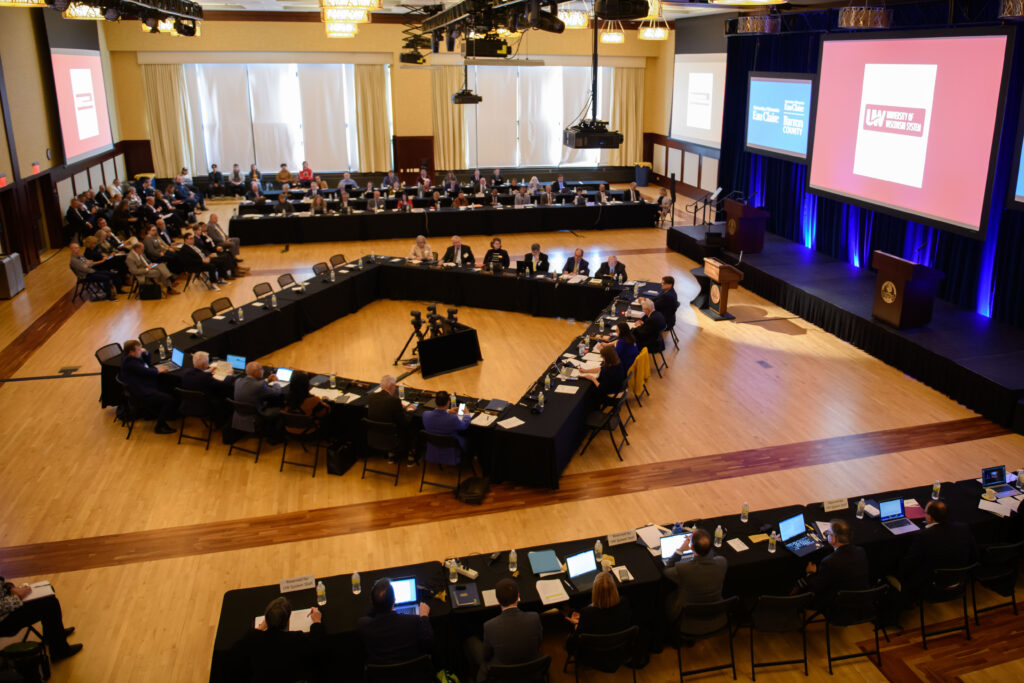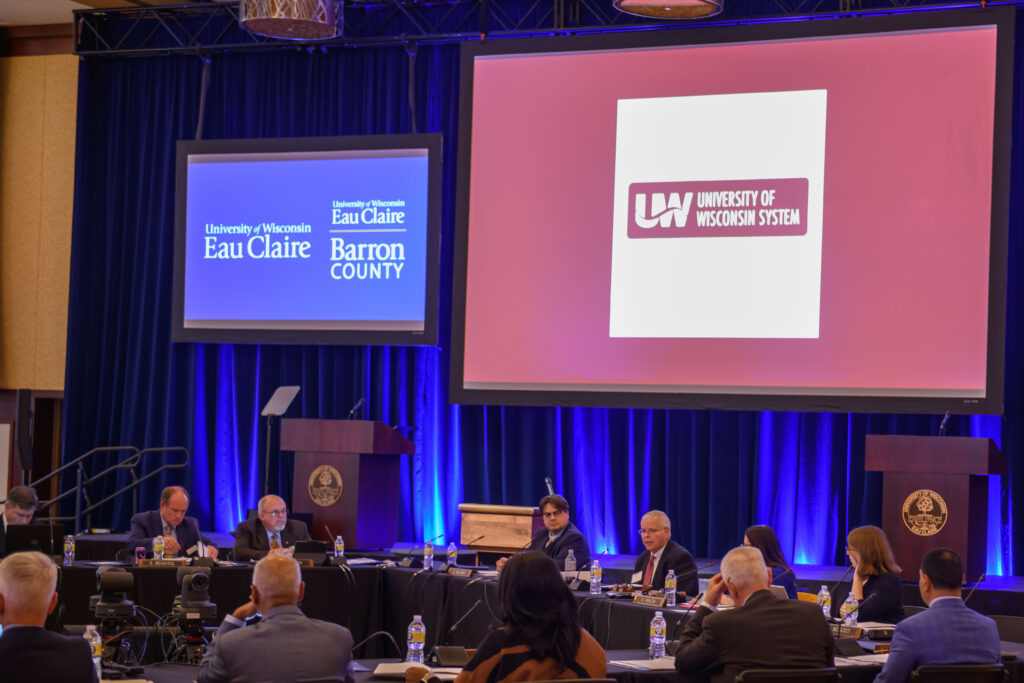EAU CLAIRE – The University of Wisconsin System is developing a forward-looking new strategic plan to address a key question: How can the UW System best meet the challenges facing Wisconsin?
UW System President Jay Rothman told the Board of Regents Thursday the plan will be grounded on a central and unifying statement of purpose, which captures the essence of why the System exists and what it is here to do.
“Our purpose is to be leaders and fulfill the Wisconsin Idea by delivering transformative educational outcomes as well as creating and advancing knowledge that enhances the quality of life for all in Wisconsin and beyond,” Rothman said.
Rothman said the vision presented Thursday should be considered a strategic framework, with the actual strategic plan – complete with strategies, key success measures, and tactics or action items – to be presented to the Board by the end of the year.
Rothman told Regents the UW System’s plan will founded on three key core values:
- The UW System will be purpose-driven. It will be student-centered. The pursuit of truth will continue to drive the core research mission and serve as the foundation for teaching and learning. The advancement of knowledge and the search for a deeper understanding of the world and our place in it are central to the UW System’s work and its core value. The UW System will also be committed to service to the State of Wisconsin and to the public good in general.
- The UW System will be people-focused. Its best work is done working together in a collaborative and supportive environment. Diversity, equity, inclusion, and belonging are key to the System’s long-term success. Mutual respect and trust will be supported in an environment of civility, trust, collegiality, open and honest communication, as well as a sense of community and caring among faculty, staff, students, and community partners.
- The UW System is committed to stewardship, focusing on the best interests of those who work and learn at the universities that comprise the system and the State of Wisconsin. Key components of that stewardship include accountability, the System being committed to live its core values and deliver excellence every day; integrity, with the System adhering to high standards of ethics and professionalism and safeguarding the reputation of the System and the universities that comprise it; innovation, understanding the importance of adapting to changing conditions, being open to new ideas, and continuously seeking solutions to challenges faced; and sustainability, taking the long-term view to ensure the System is structured and supported to serve the people of Wisconsin for generations to come.
Rothman told Regents the final strategic plan will set out over-arching goals to meet Wisconsin needs in three vital areas:
- Advance economic prosperity
- Enhance the student experience and social mobility
- Foster civic engagement and serve the public good
To advance economic prosperity, the UW System aims to foster a culture of innovation across the system; support the employer community by meeting pressing workforce and other needs; ensure that UW System universities are financially sustainable and operationally efficient; and promote differentiation among the universities.
UW-Green Bay Chancellor Mike Alexander, drawing his university’s focus on not only partnering with innovative organizations but also bringing that innovation onto campus, encouraged Regents and others to “challenge why we do things and not just accept something because we’ve always done it that way as an answer.”
To enhance the student experience and social mobility, targeted strategies include: increasing access to a higher education while closing the opportunity gaps for historically underserved students; providing high-quality support for students across the higher education life cycle; promoting excellence and innovation in teaching, research, and service to improve student learning outcomes; and recruiting, developing, and retaining a high quality, diverse faculty and staff.
UW-Superior Chancellor Renée Wachter told Regents that closing the opportunity gaps once students come to campus is one of the most complicated situations universities face. After trying different options of identifying independent solutions for a “bag of marbles” approach to helping students, she said that UW-Superior is “now using a strategic, nested bowl approach to create a seamless experience, ultimately stringing the marbles together in a coherent way to create a string of pearls – a pathway of support – where each step in the student’s experience builds upon one another.”
To foster civic engagement and serve the public good, the UW System should continue to be a global leader in research, scholarship, and creative activity that advances knowledge and benefits society; adhere to the principles of free expression, academic freedom, and civil discourse; provide services and support to address societal and community needs across Wisconsin; and provide leadership in fostering environmental sustainability across UW institutions.
Addressing the prominent role research plays in UW-Madison’s mission, Chancellor Jennifer Mnookin told Regents, “Staying strong as a research powerhouse requires consistent investment in people, in innovation, and in spaces, as well as a climate that generates and nurtures creativity, ideas, and engagement.” She added that “excellence at this level is both a precious commodity and fragile.”
Universities will continue to be responsible for achievement of their own strategic goals in their own plans, many of which will overlap with those articulated in Thursday’s presentation, Rothman said. “But some goals will require that we partner and collaborate with each other. For example, as a System we will explore ways in which we can leverage resources to provide better access to mental health care for students.”
Regent Bob Atwell commended the work done to date, noting that “why and who is where the process has to start. What and how is the work yet to be done.” He added, “I believe the state has the capacity and the need to invest. We need to have consensus on how and where to invest. That’s the really hard work yet to come.”
Going forward, next steps include additional stakeholder engagement; continued refinement of plan/strategies; setting of specific targets and measures; implementation planning; and launch of initiatives.

UW-Eau Claire Chancellor James Schmidt’s message of ‘Inclusion, Innovation and Impact!’ was part of Thursday’s Board of Regents meeting.
UW-Eau Claire: “Inclusion, Innovation, Impact!”
Chancellor James Schmidt told Regents that UW-Eau Claire has for more than a century provided students with the experiences, knowledge and skills to prepare them to be tomorrow’s leaders. The university has forged strategic partnerships that are “opening more doors and positively impacting our region, our state and beyond,” he said.
Five years ago, UW-Eau Claire signed a joint research agreement with Mayo Clinic Health System, just the second such agreement in the world, Schmidt said. The agreement allows UW-Eau Claire students and faculty to collaborate with Mayo Clinic physicians and clinicians on innovative research, Schmidt said.
“In only five years, thanks to our collaboration, we are impacting the learning experience of our students, expanding opportunities for our faculty, creating a stronger talent pipeline for our region and improving patient care,” Schmidt said. “Our collaboration has inspired new initiatives that Mayo Clinic Health System or UW-Eau Claire could not have accomplished on our own.”
The collaboration between UW-Eau Claire and Mayo Clinic Health System has linked the energy of young minds with opportunities for improved patient care, said Dr. Richard Helmers, regional vice president of Mayo Clinic Health System in Northwest Wisconsin.
“A crucial part of our success here has been our partnership with UW-Eau Claire,” Helmers said. “Working together with UW-Eau Claire allows us to take better care of our patients.”
Dr. Tim Nelson, director of research and innovation at Mayo Clinic Health System in Northwest Wisconsin, noted that Mayo Clinic personnel have worked with UW-Eau Claire students and faculty on more than 24 research projects over the past five years.
Nelson, a UW-Eau Claire graduate, said Mayo Clinic Health System physicians and clinicians are energized by the collaboration with students and UW-Eau Claire faculty, and the support of the Eau Claire community.
“Together, we can really transform health care,” Nelson said.
The Mayo Clinic collaboration is central to UW-Eau Claire’s implementation of a $9.4 million Workforce Innovation Grant the university received in 2021 from the Wisconsin Economic Development Corp. to strengthen the workforce for rural health and well-being, said Dr. Michael Carney, assistant chancellor for strategic partnerships and program development. Carney and Dr. Carmen Manning, dean of the College of Education and Human Sciences, spearheaded UW-Eau Claire’s ambitious effort to secure the WEDC grant.
The collaboration with Mayo Clinic and other organizations through the grant will help address workforce shortages for nurses, teachers and social workers in rural communities.
Regent President’s Report
In her regular report to the Board, Regent President Karen Walsh provided an update on two current chancellor searches. She said the UW-Platteville search and screen committee held a series of listening sessions earlier this month to get feedback from members of the campus and surrounding community on what qualities the search committee should be looking for in the next chancellor. The committee, chaired by Regent Vice President Amy Bogost, will meet in October to select and interview semifinalist candidates.
Walsh said the members of the search and screen committee for the UW-Platteville chancellor search were announced earlier this week. Regent Cris Peterson will serve as chair of the committee and Christina Curras, Professor and Chair of the Civil and Environmental Engineering Department, will serve as vice chair. Other committee members include faculty, staff, student, and community representatives, as well as Regents Scott Beightol, Mike Jones, Rodney Parsch, and Brianna Tucker. Listening sessions will be held in coming weeks.
Both searches are expected to be completed early next year.
Walsh also called attention to a new mural on display at UW-Madison’s School of Veterinary Medicine. The artwork was created by Milwaukee artist Tia Richardson and was commissioned as part of the Iverson Bell Midwest Regional Diversity Summit. The biennial summit, hosted for the first time UW-Madison, is named for the first African-American veterinarian to hold the position of vice president of the American Veterinary Medical Association.
“It’s a wonderful tribute both to veterinary medicine and the spirit of working together to get things done,” Walsh said.
Walsh provided a look-ahead to the Board’s next meeting, a one-day session on Nov. 10 in Madison. She told Regents national and local leaders of Hillel, the world’s largest Jewish student organization, are expected to present. The November meeting will also feature the annual update on efforts around the UW System to educate faculty, staff, and students about rights and responsibilities related to freedom of expression.
System President’s Report
With the 2022-23 academic year now under way, President Jay Rothman provided an overview of highlights from recent events. He noted that Tom Gibson was recently installed as the 15th chancellor of UW-Stevens Point, and two other inaugurations are forthcoming: UW-Stout Chancellor Katherine Frank on Oct. 14 and UW-River Falls Chancellor Maria Gallo on Oct. 20.
Having just completed his tour of all 13 UW universities, Rothman said he appreciated the willingness and openness of chancellors, faculty, staff, students and community members to share their passion for the UW and higher education. Their engagement and input have been valuable in developing the UW System’s new strategic plan, he said.
He also noted that the “100 student stories in 100 days” project has concluded – racking up almost 277,000 views and clicks overall between Facebook, LinkedIn and YouTube. “What sticks with me about this story project is the profound difference the UW makes in our students’ lives,” he said.
Rothman reported that he recently met with members of Wisconsin’s federal delegation and their staff and had productive conversations about the value of the UW System. “I encouraged them to continue to support efforts to fully fund student financial aid programs and research efforts,” Rothman said. “I was also pleased to find them engaged on topics like the Tuition Promise program, the freedom of expression survey, and the need to graduate more students.”
Turning to enrollment numbers, Rothman told Regents new student enrollment at the main campuses this fall is the highest since at least 2018, based on preliminary estimates for the first day of classes. First-day estimates show 26,422 first-year students enrolled – up 573 over 2021 and up 840 in 2018. Overall enrollment dropped about 1 percent, not unexpected after the pandemic affected two years of enrollment.
- See the UW System news release: New student enrollment at UW System main campuses highest since at least 2018
Supporting students once they’re on campus is a priority, and a new tele-health contract will provide valuable help. Rothman said that thanks to one-time funding allocated by Gov. Evers from the American Rescue Plan Act, he will be signing a contract with Mantra Health to provide tele-mental health and wellbeing services to students to supplement on-campus services. The contract includes all campuses except UW-Madison, which pursued its own contract. Services are expected to go live for the Spring 2023 semester.
Rothman reported that the UW System is kicking off a campaign on Oct. 1 to encourage students to complete the Free Application for Federal Student Aid (FAFSA). Wisconsin currently ranks 38th for high school students completing the FAFSA form, with 50% participation for the class of 2021. The campaign, which will run through February 2023, will run on social media platforms and direct students and parents to a new UW HELP website dedicated to FAFSA.
UW System will also tout its user-friendly process for transfer students as part of National Transfer Student Week, Oct. 17-21. Rothman said it’s part of the university’s ongoing work to grow the number of college graduates in the state.
To wind up his report, Rothman recognized several significant recent accomplishments in the UW System family. The American Association of State Colleges and Universities (AASCU) is recognizing seven universities nationwide at its upcoming 2022 Excellence & Innovation Awards – and two of those seven are from the UW System, he said. UW-La Crosse will receive the AASCU Excellence and Innovation Award for Civic Learning and Community Engagement. UW-Parkside will be recognized with the AASCU Excellence & Innovation Award for Student Success and College Completion.
Also from UW-Parkside, Rothman noted that Director of Athletics Andrew Garvin was recently recognized as one of only 4 winners nationwide from Division II as Athletic Director of the Year for 2021-22 by the National Association of Collegiate Directors of Athletics.
Finally, Rothman told Regents the national America’s Small Business Development Center is honoring three Wisconsin professionals in their inaugural “40 under 40” awards, recognizing leadership in helping small businesses start and grow. The three honorees are: Heather Ferguson, program manager with the SBDC at UW-Madison; Kody Ova, marketing and communications specialists with the state SBDC office; and Zia Yang, outreach specialist with the SBDC at UW-Stevens Point. The Wisconsin SBDC is hosted by the UW System under the Institute for Business & Entrepreneurship.
Business & Finance Committee
Sean Nelson, Vice President for Finance & Administration, provided the Business & Finance committee with details on the recent consolidation of several units in UW System Administration. The move combines the Offices of Administration and Finance, as well as Shared Services, into one office headed by Nelson. The one exception is the Risk Management function, now under the Office of Compliance.
The reorganization aims to improve efficiencies and communications in a structure that mirrors the vast majority of public higher education system administrations.
In other business, the Business & Finance Committee:
- Approved a proposal to rescind Regent Policy Document 22-2, which provides guidelines on the disposal of works of art. After review, it was determined this subject is more appropriately addressed at the System level;
- Heard a presentation from UW-Eau Claire Vice Chancellor for Finance and Administration Grace Crickette, who offered details on a new financial planning program that is aimed at maximizing the administrative and financial efficiency of operations across all of UW-Eau Claire.
Education Committee
Two Senior Student Affairs Officers (SSAOs) facilitated a discussion with several Directors of Disability/Accessibility Services regarding the increasing number of students seeking accommodations on UW campuses and the complexities associated with providing these students with the access and support they need to be successful.
Data from the recently completed 2021-22 Services for Students with Disabilities Annual Report was shared, focusing on the increasing numbers of students with psychological disabilities and those with autism, and their unique needs.
The goal of the discussion was to build an understanding of this growing population of students; draw connections between students with disabilities and the behavioral health agenda; and highlight the challenges and opportunities to enhance services going forward.
In other business, the Education Committee:
- Approved a Bachelor of Business Analytics at UW-La Crosse, which will prepare students to succeed in a data-driven world, providing exposure to software platforms and techniques used to store, transform, manipulate, analyze and interpret small and large sets of data;
- Heard a presentation by UW-Eau Claire on strategies to expand access to high-impact experiences for LGBTIQA+ students. The discussion included exploring one innovative research effort, QFest, as well as other innovative and inclusive strategies that support LGBTIQA+ students at UW-Eau Claire; and
- Heard an update on a systemwide caregiving task force, collaboratively formed in August of 2020 to include the Office of Women’s and Gender Studies and the UW System Alliance for Inclusive, Diversity, Equity, and Advancement in STEM. The task force arose in response to immediate impacts of COVID-19, as well as ongoing equity issues related to caregiving and family status.
Capital Planning & Budget Committee
The Capital Planning & Budget Committee approved UW-Madison’s request for authority to enter into a lease of 50,969 square feet located at 5510 Element Way, Madison, to be occupied by UW-Madison research units.
UW-Madison’s recruitment of world-class faculty is impeded by their inability to provide high quality research lab space in a timely manner for new faculty. The leased space will be located in a new building currently under construction at the University Research Park.
Additional lab spaces will enable new faculty to begin research on arrival at UW-Madison and then transition to on-campus space as options are identified and upgrade projects are completed. The space may also be used for established research and/or research cneters to free up space on campus for new faculty research, allowing new faculty to be on-site at their respective departments, supporting their integration into the university research community.
The lease could also provide additional Biosafety Level 3-capable space, another identified space need on campus. The University Research Park Element Lab provides a unique opportunity to provide modern research laboratory space located close to campus.
In other business, the Capital Planning & Budget Committee:
- Approved UW-Platteville’s request for authority to sell a 1.028-acre parcel of land with improvements located at 895 W. Main Street, Platteville. The property, purchased in 1997, includes a single-family home which has been used as the chancellor’s residence since 1997. It would require significant and costly updates;
- Approved a request by UW-La Crosse for authority to transfer a .02-acre parcel of land to the City of La Crosse in exchange for a .04-acre parcel of land located in La Crosse County. Both parcels are vacant;
- Approved UW-Madison’s request for authority to complete the design and construction of the Engineering Hall Mechanics Lab 1313 Renovation project for an estimated total project cost of $2,063,000 Gift/Grant Funding. The project will renovate 2,800 SF of the Experimental Mechanics teaching laboratories in two rooms in Engineering Hall which require renovation to reflect the substantial advances in experimental equipment technology. The lab serves an average of 200 students each year;
- Approved a request by UW-Madison for authority to increase the scope and budget of the Rowe WHAM Plasma Physics Lab Electrical and Cooling upgrade of $991,000 for an estimated total project cost of $2,555,000 gift/grant funding. This UW Managed project upgrades facility electrical power and process cooling capacity in the KRC-SRC Rowe Building at the Physical Sciences Laboratory to support a fusion energy research project called the Wisconsin High-temperature-superconducting Axisymmetric Mirror (WHAM);
- Approved UW-Madison’s request for authority to construct the Microbial Sciences Building Second Floor Research Lab Renovation project for an estimated total project cost of $1,554,000 Gift/Grant Funding. The project converts three rooms into two Biosafety Level 2 laboratories, and provides additional wet laboratory research space for faculty recruitment growth in the Department of Medical Microbiology and Immunology;
- Approved UW System’s request for authority to construct two All Agency maintenance and repair projects at an estimated cost of $7,986,600 ($2,899,000 General Fund Supported Borrowing; $3,988,400 Program Revenue Supported Borrowing; $1,099,200 Cash). The first project replaces exterior windows at UW-Madison’s Slichter Hall and the second replaces the chiller plant unit #1 in UW-La Crosse’s east plant;
- Approved UW-System’s request for authority to construct two minor facilities renewal projects at an estimated cost of $11,118,000 ($4,260,000 General Fund Supported Borrowing; $5,872,000 Program Revenue Supported Borrowing; and $986,000 Cash). The first project repairs the Fluno Center Plaza’s underground parking garage at UW-Madison and the second replaces the heating and cooling plant boilers 3 and 4 at UW-Parkside;
- Heard an update on UW-Madison’s Real Estate Initiatives and specifically their West Innovation Park Master Plan;
- Heard a UW-Eau Claire host campus presentation on Innovative Solutions to Capital Needs. After decades of minimal capital investments and an average building age of 52 years, UW-Eau Claire is looking to innovative partnerships to address facility needs, from public-private collaborations with Blugold Real Estate, the City of Eau Claire, and private partners, to leveraging renovation opportunities to advance its strategic plan; and
- Heard a report from Senior Associate Vice President Alex Roe on the submitted 2023-29 Capital Plan request and next steps.
Audit Committee
Edward Murphy, UW System’s Associate Vice President for Information Security, provided the Audit Committee with an update on information technology security. He noted that major initiatives are underway to migrate vital systems to the cloud, but in the interim, the university system is attacked hundreds of times a day.
Murphy provided a brief status report on information security, highlighting the following areas: Enterprise Risk Management alignment; top challenges; information security roadmap progress report; and top priorities.
In other business, the Audit Committee:
- Heard a progress report on the Fiscal Year 2023 Audit Plan;
- Heard a report from Chief Audit Executive Lori Stortz; and
- Heard a host campus presentation on the CARE model for Compliance, Audit, Risk, and Ethics, which systematically shares risk and internal control data, information, knowledge, and solutions across all colleges and departments. Vice Chancellor Grace Crickette explained the framework and tools that are leveraged to understand and communicate the model’s effectiveness.
Photo Credit: Bill Hoepner/UW-Eau Claire
The University of Wisconsin System Board of Regents will resume its meeting on Friday, Sept. 30, 2022, at UW-Eau Claire.

UW System Board of Regents President Karen Walsh led the UW-Eau Claire Blugold Marching Band during a noon-hour performance.


